2021 in the environment
| |||
|---|---|---|---|
| +... |
| 2021 in science |
|---|
| Fields |
| Technology |
| Social sciences |
| Paleontology |
| Extraterrestrial environment |
| Terrestrial environment |
| Other/related |
This is an article of notable issues relating to the terrestrial environment of Earth in 2021. They relate to environmental events such as natural disasters, environmental sciences such as ecology and geoscience with a known relevance to contemporary influence of humanity on Earth, environmental law, conservation, environmentalism with major worldwide impact and environmental issues.
Events
This section needs expansion. You can help by adding to it. (May 2021) |
| Date / period | Type of event | Event | Topics | Image |
|---|---|---|---|---|
| January 11 | Coordination, Policy | The One Planet Summit is held as a virtual event. Results: 50 nations of the "High Ambition Coalition" agree to aim to protect 30 % of their terrestrial and marine areas, financing of the Great Green Wall (Africa) is agreed to. | ||
| February 1 | Policy | Chinese national carbon trading scheme is launched[1][2] The nationwide carbon trading market is set to launch by June.[3] |
Environmental disasters
| To display all pages, subcategories and images click on the "►": |
|---|
Environmental sciences
| Date / period | Type | Description | Topics | Image |
|---|---|---|---|---|
| January 6 | Review | In the first scientific systematic review of the scientific evidence around global waste, its management and impact on human health and life, authors provide assessments, suggestions for corrective action, engineering solutions and requests for further research. They find that about half of all the municipal solid terrestrial waste – or close to one billion tons per year – is either not collected or mismanaged after collection, often being burned in open and uncontrolled fires. Authors conclude that "massive risk mitigation can be delivered" while noting that broad priority areas each lack a "high-quality research base", partly due to the absence of "substantial research funding", which scientists often require.[4][5] | [waste] | 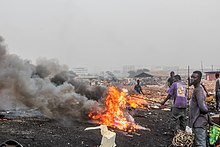
|
| January 13 | Statistics / records | A new record high temperature of the world's oceans is reported, measured from the surface level down to a depth of 2,000 metres.[6][7] | [temperature record] | 
|
| January 13 | Review, Analysis, Assessment | A group of 17 high-ranking ecologists publish a perspective piece that reviews a number of studies that, based on current trends, indicate that future environmental conditions will be far more dangerous than currently believed, concluding that current challenges – themselves in specific – that humanity faces are large and underestimated. The small group cautions that such an "optimism bias" is prevalent and that fundamental changes are required, listing a few of such they consider adequate in the form of broad descriptions in their largely static document, published by a scientific journal.[8][9][10] | [policy] | 
|
| January 22 | Review | A study described as the "first long-term assessment of global bee decline", which analyzed GBIF-data of over a century, finds that the number of bee species declined steeply after the 1990s, shrinking by a quarter in 2006–2015 compared to before 1990.[11][12] | [insect decline] | 
|
| January 25 | Review | Global ice loss is found to be accelerating at a record rate in a scientific review, matching the worst-case scenarios of the IPCC.[13][14][15] | [global warming] [sea level rise] | 
|
| January 27 | Scientists report that shark and ray populations have fallen by 71% since 1970 as a result of human actions, primarily overfishing.[16][17] | [animals] | 
| |
| February 9 | Attribution, Modelling | A study using a high spatial resolution model and an updated concentration-response function finds that 10.2 million global excess deaths in 2012 and 8.7 M in 2018 – or A review of this and a more nuanced assessment of mortality impacts in terms of contribution to death, rather than number of deceased, may be needed[dubious – discuss] – were due to air pollution generated by fossil fuel combustion, significantly higher than earlier estimates and with spatially subdivided mortality impacts.[18][19] | [air pollution] [transportation] | 
|
| February 9 | Analysis, Predictions | A study concludes that the rates of emissions reductions need to increase by 80% beyond NDCs to meet the 2 °C upper target range of the Paris Agreement, that the probabilities of major emitters meeting their NDCs without such an increase is very low, estimating that with current trends the probability of staying below 2 °C of warming is 5% and if NDCs were met and continued post-2030 by all signatory systems 26%.[20][21] | [global warming] [policy] | 
|
| February 9 | A study finds that air pollution by nitrogen dioxide could be a technosignature by which one could detect extraterrestrial civilizations via "atmospheric SETI".[22][23][24] | [air pollution] | 
| |
| February 15 | Researchers report, for the first time, the detection of lifeforms 872 m below the ice of Antarctica, at a depth of 1,233 m and 260 km from the open water at the Filchner-Ronne Ice Shelf's calving margin.[25][26][27] | [animals] | 
| |
| February 16 | Global warming is found to cause increases of pollen season lengths and concentrations.[28][29] | [global warming] | 
| |
| February 25 | Researchers confirm that the Atlantic meridional overturning circulation, which includes the Gulf Stream, is at its weakest since about 1,000 years ago, experiencing unprecedented weakening – likely due to global warming – which could result in more extreme weather events – including heatwaves and intense winters – and is moving towards a "tipping point".[30][31][32] | [] | 
| |
| March 8 | Study results indicate that limiting global warming to 1.5 °C would prevent most of the tropics from reaching the wet-bulb temperature of the human physiological limit, beyond which they are fatal after a few hours without artificial cooling.[33][34] | [global warming] | 
| |
| March 8 | Attribution | A new global food emissions database indicates that the current food systems are responsible for one third (34%) of the global anthropogenic greenhouse gas emissions.[35][36] | [Food system] | 
|
| March 12 | Review | Results of a scientific synthesis indicate that, in terms of global warming, the Amazon basin with the Amazon rainforest now emits more greenhouse gases than it absorbs overall due to climate change impacts and human activities in the area – mainly deforestation.[37][38] | [deforestation] [forests] | 
|
| March 17 | Assessment, Development | A study finds that an optimized globally coordinated marine conservation could be "nearly twice as efficient as uncoordinated, national-level" planning and estimates that bottom trawling releases as much CO2-emissions as pre-COVID-19 aviation.[39][40][41] | [ocean] [policy] | 
|
| March 18 | Attribution | An accepted preprint finds that the severity of heatwave and drought impacts on crop production roughly tripled over the last 50 years in Europe.[42][43] | [extreme weather] | 
|
| March 29 | Attribution, Analysis | In a static proprietary article that appeared in and was reviewed by a scientific journal, authenticated scientists analyze data from multiple public databases to create a regional representation of levels of deforestation induced by nations' recent, largely unmodulated, trade-, production- and consumption-patterns, showing e.g. that the G7 are driving an average annual loss of 3.9 trees per capita and that India and China increased the deforestation embodied in their imports.[44][45] | [deforestation] | 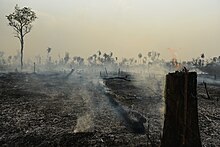
|
| March 29 | Observation | A case-control study of cities finds that redistributing street space for cycling infrastructure – for so-called "pop-up bike lanes" – during the COVID-19 pandemic lead to large additional increases in cycling.[46][47] | [global warming] [policy] | 
|
| March 29 | Analysis | The extensive pesticide pollution risks worldwide are estimated with a new environmental model.[48][49] | [] | 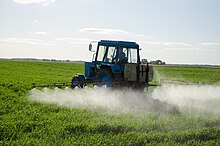
|
| April 6 | A study finds that carbon emissions from Bitcoin mining in China – where a majority of the proof-of-work algorithm that generates current economic value is computed, largely fueled by nonrenewable sources – have accelerated rapidly, would soon exceed total annual emissions of countries like Italy and Spain in 2016 and interfere with climate change mitigation commitments.[50][51] | [] | 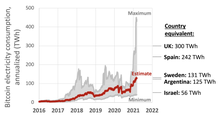
| |
| April 7 | Statistics / records | The NOAA reports the largest annual increase in methane emissions since records began, with a rise of 14.7 parts per billion (ppb) in 2020.[52] | [Methane emissions] | 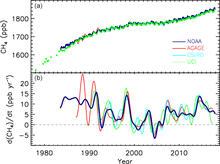
|
| April 12 | Meta | The magazine Scientific American announces that it will stop using the term "climate change" in articles about human-caused global warming and substitute "climate emergency" instead.[53] | [] | 
|
| April 12 | Development | News outlets report that the first prototype 3D printed house made out of clay, Tecla, has been completed. The low-carbon housing was printed by two large arms from a mix of mainly locally-sourced soil and water.[54][55][56] Such buildings could be highly cheap, well-insulated, stable, get produced rapidly, require only very little easily learnable manual labor, mitigate carbon emissions from concrete, require less energy, reduce homelessness, help enable intentional communities, and enable the provision of housing for victims of natural disasters as well as for migrants to Europe near their homes, rather than political facilitation of their influx. | [] | 
|
| April 12 | Development | Scientists develop a prototype and design rules for both-sides-contacted silicon solar cells with conversion efficiencies of 26% and above, Earth's highest for this type of solar cell.[57][58] | [] | |
| April 15 | Development | Researchers demonstrate the whitest ever paint formulation, which reflects up to 98.1% of sunlight and could be used in place of air conditioners.[59][60] | [] | 
|
| April 16 | Scientists report that in the case of Alaskan forests, such boreal forests recovered from wildfires by shifting to a deciduous-coniferous mix, which could offset the carbon emitted during the fires.[61][62] | [] | 
| |
| April 23 | Assessment | Scientists report that of ~39 million groundwater wells 6-20% are at high risk of running dry, particularly that this would likely occur if local groundwater levels decline by less than 5 meters, or – as with many areas and possibly more than half of major aquifers[63] – if they continue to decline.[64][65] | [] | 
|
Geosciences, biotechnology, anthropology and geoengineering
| Date / period | Type | Description | Topics | Image |
|---|---|---|---|---|
| January 13 | Scientists report that all glacial periods of ice ages over the last 1.5 M years were associated with northward shifts of melting Antarctic icebergs which changed ocean circulation patterns, leading to more CO2 being pulled out of the atmosphere. Authors note that this process may be disrupted as the Southern Ocean may be too warm for the icebergs to travel far enough to trigger these changes or effects.[66][67][68] | [climate change] | 
| |
| February 19 | Scientists report that the short global geomagnetic reversal – a geomagnetic excursion – of Earth's magnetic field ~42,000 years ago – the Laschamp event – in combination with grand solar minima, caused major extinctions and environmental changes and may have contributed to the extinction of the Neanderthals and appearances of cave art. It altered the geographical extension of auroras and levels of harmful radiation worldwide. They term the event which they find to constitute a major enviro-archaeological boundary "Adams Transitional Geomagnetic Event".[69][70] | [geomagnetic reversal] | 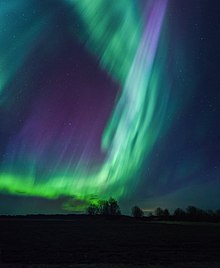
| |
| March 30 | Scientists report evidence of subglacial sediment stored since 1966 that indicates that Greenland was ice-free and vegetated at least once within the last million years.[71][72] | 
| ||
| April 2 | Scientists report that the event that caused the mass-extinction of dinosaurs gave rise to neotropical rainforest biomes like the Amazonia, replacing species composition and structure of local forests. During ~6 million years of recovery to former levels of plant diversity, they evolved from widely-spaced gymnosperm-dominated forests to the forests with thick canopies which block sunlight, prevalent flowering plants and high vertical layering as known today.[73][74] | 
|
Environmental policy
- 5 February – Australia's Northern Territory bans seabed mining in its coastal waters.[75]
Predicted and scheduled events
- 1–12 November – 2021 United Nations Climate Change Conference
International goals
A list of − mostly self-imposed and legally voluntary or unenforceable − goals related to the environment and/or environmental sciences due by or established in 2021 as decided by multinational corporate associations or international governance entities and their status:
| Entity | Agreement | Goal | Status |
|---|---|---|---|
| Plan S | Plan S is an initiative for open-access science publishing launched in 2018[76][77] by "cOAlition S",[78] a consortium of national research agencies and funders from twelve European countries. The plan requires scientists and researchers who benefit from state-funded research organisations and institutions to publish their work in open repositories or in journals that are available to all by 2021.[79] The "S" stands for "shock".[80] | ||
| Paris Agreement |
- Result reports
| Entity | Agreement | Goal | Status |
|---|---|---|---|
| Aichi Target 11, 2010 (1) | Protecting 17% of Earth's land by 2020 | Yes (16.64 % officially reported, assessed as likely exceeding 17 %)[81] | |
| Aichi Target 11, 2010 (2) | Protecting 10% of Earth's marine environments by 2020 | No (7.74 %)[81] |
A session of the United Nations General Assembly decided that the theme and Sustainable Development Goals discussed at the 2021 High-level Political Forum will be "Sustainable and resilient recovery from the COVID-19 pandemic that promotes the economic, social and environmental dimensions of sustainable development: building an inclusive and effective path for the achievement of the 2030 Agenda in the context of the decade of action and delivery for sustainable development".[82]
Goal-oriented coordination
This section needs expansion. You can help by adding to it. (January 2021) |
Governmental budgets
- 22 April –
 Brazil's political leader, Jair Bolsonaro, or his leadership apparatus decides to cut the government's annual environmental budget by 23 % compared to the previous year, making it the lowest in the history of the nation since the 1990s and reducing means to protect the Amazon rainforest.[83][84]
Brazil's political leader, Jair Bolsonaro, or his leadership apparatus decides to cut the government's annual environmental budget by 23 % compared to the previous year, making it the lowest in the history of the nation since the 1990s and reducing means to protect the Amazon rainforest.[83][84] - 3 May – It is announced that
 Germany will spend an additional 5 billion euros to reduce emissions from the steel industry and will finance steelmakers' hydrogen production projects.[85]
Germany will spend an additional 5 billion euros to reduce emissions from the steel industry and will finance steelmakers' hydrogen production projects.[85]
See also
- List of volcanic eruptions in the 21st century
- Energy development
- Green recovery
- Timeline of solar cells#2021
- 2021 in space
- Lists of extinct animals#Recent extinction
- Category:Species described in 2021
- Category:Protected areas established in 2021
References
- ^ "Q&A: What is China's carbon trading scheme?". phys.org. Retrieved 27 May 2021.
- ^ "China launched its national carbon trading market yesterday". TechCrunch. Retrieved 27 May 2021.
- ^ "China to launch nationwide carbon trading market by June, starting with 2,225 companies". Republic World. Retrieved 27 May 2021.
- ^ "Health crisis: Up to a billion tons of waste potentially burned in the open every year". phys.org. Retrieved 13 February 2021.
- ^ Cook, E.; Velis, C. A. (6 January 2021). "Global Review on Safer End of Engineered Life". Global Review on Safer End of Engineered Life. Retrieved 13 February 2021.
- ^ "Upper ocean temperatures hit record high in 2020". EurekAlert!. 13 January 2021. Retrieved 13 January 2021.
- ^ Cheng, Lijing; Abraham, John; Trenberth, Kevin E.; Fasullo, John; Boyer, Tim; Locarnini, Ricardo; Zhang, Bin; Yu, Fujiang; Wan, Liying; Chen, Xingrong; Song, Xiangzhou; Liu, Yulong; Mann, Michael E.; Reseghetti, Franco; Simoncelli, Simona; Gouretski, Viktor; Chen, Gengxin; Mishonov, Alexey; Reagan, Jim; Zhu, Jiang (13 January 2021). "Upper Ocean Temperatures Hit Record High in 2020". Advances in Atmospheric Sciences. 38 (4): 523–530. doi:10.1007/s00376-021-0447-x. ISSN 1861-9533. Retrieved 13 February 2021.
- ^ "Top scientists warn of 'ghastly future of mass extinction' and climate disruption". The Guardian. 13 January 2021. Retrieved 12 February 2021.
- ^ "Avoiding a 'Ghastly Future': Hard Truths on the State of the Planet". Yale E360. Retrieved 12 February 2021.
- ^ Bradshaw, Corey J. A.; Ehrlich, Paul R.; Beattie, Andrew; Ceballos, Gerardo; Crist, Eileen; Diamond, Joan; Dirzo, Rodolfo; Ehrlich, Anne H.; Harte, John; Harte, Mary Ellen; Pyke, Graham; Raven, Peter H.; Ripple, William J.; Saltré, Frédérik; Turnbull, Christine; Wackernagel, Mathis; Blumstein, Daniel T. (2021). "Underestimating the Challenges of Avoiding a Ghastly Future". Frontiers in Conservation Science. 1. doi:10.3389/fcosc.2020.615419. ISSN 2673-611X. Retrieved 12 February 2021.
 Available under CC BY 4.0.
Available under CC BY 4.0.
- ^ Shah, Karina. "A quarter of all known bee species haven't been seen since the 1990s". New Scientist. Retrieved 11 February 2021.
- ^ Zattara, Eduardo E.; Aizen, Marcelo A. (22 January 2021). "Worldwide occurrence records suggest a global decline in bee species richness". One Earth. 4 (1): 114–123. doi:10.1016/j.oneear.2020.12.005. ISSN 2590-3330. Retrieved 11 February 2021.
- ^ "Global ice loss accelerating at record rate, study finds". The Guardian. 25 January 2021. Retrieved 25 January 2021.
- ^ "Global ice loss increases at record rate". EurekAlert!. 25 January 2021. Retrieved 25 January 2021.
- ^ Slater, Thomas; Lawrence, Isobel R.; Otosaka, Inès N.; Shepherd, Andrew; Gourmelen, Noel; Jakob, Livia; Tepes, Paul; Gilbert, Lin; Nienow, Peter (25 January 2021). "Review article: Earth's ice imbalance". The Cryosphere. 15 (1): 233–246. doi:10.5194/tc-15-233-2021. ISSN 1994-0416. Retrieved 12 February 2021.
 Available under CC BY 4.0.
Available under CC BY 4.0.
- ^ Einhorn, Catrin (January 27, 2021). "Shark Populations Are Crashing, With a 'Very Small Window' to Avert Disaster". The New York Times. Retrieved February 16, 2021.
- ^ Pacoureau, Nathan; Rigby, Cassandra L.; Kyne, Peter M.; Sherley, Richard B.; Winker, Henning; Carlson, John K.; Fordham, Sonja V.; Barreto, Rodrigo; Fernando, Daniel; Francis, Malcolm P.; Jabado, Rima W.; Herman, Katelyn B.; Liu, Kwang-Ming; Marshall, Andrea D.; Pollom, Riley A.; Romanov, Evgeny V.; Simpfendorfer, Colin A.; Yin, Jamie S.; Kindsvater, Holly K.; Dulvy, Nicholas K. (2021). "Half a century of global decline in oceanic sharks and rays". Nature. 589 (7843): 567–571. doi:10.1038/s41586-020-03173-9. PMID 33505035. S2CID 231723355.
- ^ Green, Matthew (9 February 2021). "Fossil fuel pollution causes one in five premature deaths globally: study". Reuters. Retrieved 5 March 2021.
- ^ Vohra, Karn; Vodonos, Alina; Schwartz, Joel; Marais, Eloise A.; Sulprizio, Melissa P.; Mickley, Loretta J. (1 April 2021). "Global mortality from outdoor fine particle pollution generated by fossil fuel combustion: Results from GEOS-Chem". Environmental Research. 195: 110754. doi:10.1016/j.envres.2021.110754. ISSN 0013-9351. PMID 33577774. Retrieved 5 March 2021.
- ^ "Limiting warming to 2 C requires emissions reductions 80% above Paris Agreement targets". phys.org. Retrieved 6 March 2021.
- ^ Liu, Peiran R.; Raftery, Adrian E. (9 February 2021). "Country-based rate of emissions reductions should increase by 80% beyond nationally determined contributions to meet the 2 °C target". Communications Earth & Environment. 2 (1): 1–10. doi:10.1038/s43247-021-00097-8. ISSN 2662-4435. PMC 8064561. PMID 33899003.
 Available under CC BY 4.0.
Available under CC BY 4.0.
- ^ "Pollution on other planets could help us find aliens, Nasa says". The Independent. 12 February 2021. Retrieved 6 March 2021.
- ^ "Can Alien Smog Lead Us to Extraterrestrial Civilizations?". Wired. Retrieved 6 March 2021.
- ^ Kopparapu, Ravi; Arney, Giada; Haqq-Misra, Jacob; Lustig-Yaeger, Jacob; Villanueva, Geronimo (22 February 2021). "Nitrogen Dioxide Pollution as a Signature of Extraterrestrial Technology". The Astrophysical Journal. 908 (2): 164. arXiv:2102.05027. doi:10.3847/1538-4357/abd7f7. ISSN 1538-4357. Retrieved 6 March 2021.
{{cite journal}}: CS1 maint: unflagged free DOI (link) - ^ Guenot, Marianne (15 February 2021). "Scientists accidentally found life under 3,000 feet of ice in Antarctica. 'Never in a million years' would they have expected it, the lead scientist said". Business Insider. Retrieved 15 February 2021.
- ^ Simon, Matt (15 February 2021). "Scientists Accidentally Discover Strange Creatures Under a Half Mile of Ice - Researchers only drilled through an Antarctic ice shelf to sample sediment. Instead, they found animals that weren't supposed to be there". Wired. Retrieved 15 February 2021.
- ^ Griffiths, Huw J.; et al. (15 February 2021). "Breaking All the Rules: The First Recorded Hard Substrate Sessile Benthic Community Far Beneath an Antarctic Ice Shelf". Frontiers in Marine Science. 8. doi:10.3389/fmars.2021.642040. S2CID 231920652. Retrieved 15 February 2021.
 Available under CC BY 4.0.
Available under CC BY 4.0.
- ^ Schwartz, John (8 February 2021). "Achoo! Climate Change Lengthening Pollen Season in U.S., Study Shows". The New York Times. Retrieved 7 March 2021.
- ^ Anderegg, William R. L.; Abatzoglou, John T.; Anderegg, Leander D. L.; Bielory, Leonard; Kinney, Patrick L.; Ziska, Lewis (16 February 2021). "Anthropogenic climate change is worsening North American pollen seasons". Proceedings of the National Academy of Sciences. 118 (7): e2013284118. doi:10.1073/pnas.2013284118. ISSN 0027-8424. PMC 7896283. PMID 33558232.
 Available under CC BY 4.0.
Available under CC BY 4.0.
- ^ correspondent, Fiona Harvey Environment (26 February 2021). "Atlantic Ocean circulation at weakest in a millennium, say scientists". The Guardian. Retrieved 7 March 2021.
{{cite news}}:|last1=has generic name (help) - ^ "Gulf Stream System at its weakest in over a millennium". phys.org. Potsdam Institute for Climate Impact Research. Retrieved 7 March 2021.
- ^ Caesar, L.; McCarthy, G. D.; Thornalley, D. J. R.; Cahill, N.; Rahmstorf, S. (25 February 2021). "Current Atlantic Meridional Overturning Circulation weakest in last millennium". Nature Geoscience. 14 (3): 118–120. doi:10.1038/s41561-021-00699-z. ISSN 1752-0908. Retrieved 7 March 2021.
- ^ "Global heating pushes tropical regions towards limits of human livability". The Guardian. 8 March 2021. Retrieved 19 April 2021.
- ^ Zhang, Yi; Held, Isaac; Fueglistaler, Stephan (March 2021). "Projections of tropical heat stress constrained by atmospheric dynamics". Nature Geoscience. 14 (3): 133–137. doi:10.1038/s41561-021-00695-3. ISSN 1752-0908. Retrieved 19 April 2021.
- ^ "FAO - News Article: Food systems account for more than one third of global greenhouse gas emissions". www.fao.org. Retrieved 22 April 2021.
- ^ Crippa, M.; Solazzo, E.; Guizzardi, D.; Monforti-Ferrario, F.; Tubiello, F. N.; Leip, A. (March 2021). "Food systems are responsible for a third of global anthropogenic GHG emissions". Nature Food. 2 (3): 198–209. doi:10.1038/s43016-021-00225-9. ISSN 2662-1355. Retrieved 22 April 2021.
- ^ Fox, Alex. "The Amazon Rainforest Now Emits More Greenhouse Gases Than It Absorbs". Smithsonian Magazine. Retrieved 19 April 2021.
- ^ Covey, Kristofer; Soper, Fiona; Pangala, Sunitha; Bernardino, Angelo; Pagliaro, Zoe; Basso, Luana; Cassol, Henrique; Fearnside, Philip; Navarrete, Diego; Novoa, Sidney; Sawakuchi, Henrique; Lovejoy, Thomas; Marengo, Jose; Peres, Carlos A.; Baillie, Jonathan; Bernasconi, Paula; Camargo, Jose; Freitas, Carolina; Hoffman, Bruce; Nardoto, Gabriela B.; Nobre, Ismael; Mayorga, Juan; Mesquita, Rita; Pavan, Silvia; Pinto, Flavia; Rocha, Flavia; de Assis Mello, Ricardo; Thuault, Alice; Bahl, Alexis Anne; Elmore, Aurora (2021). "Carbon and Beyond: The Biogeochemistry of Climate in a Rapidly Changing Amazon". Frontiers in Forests and Global Change. 4. doi:10.3389/ffgc.2021.618401. ISSN 2624-893X. Retrieved 19 April 2021.
 Available under CC BY 4.0.
Available under CC BY 4.0.
- ^ "Having it all: Protecting biodiversity, carbon capture, and fish stocks". Ars Technica. 24 March 2021. Retrieved 19 April 2021.
- ^ "Targeted ocean protection could offer 3X the benefits". World Economic Forum. Retrieved 19 April 2021.
- ^ Sala, Enric; Mayorga, Juan; Bradley, Darcy; Cabral, Reniel B.; Atwood, Trisha B.; Auber, Arnaud; Cheung, William; Costello, Christopher; Ferretti, Francesco; Friedlander, Alan M.; Gaines, Steven D.; Garilao, Cristina; Goodell, Whitney; Halpern, Benjamin S.; Hinson, Audra; Kaschner, Kristin; Kesner-Reyes, Kathleen; Leprieur, Fabien; McGowan, Jennifer; Morgan, Lance E.; Mouillot, David; Palacios-Abrantes, Juliano; Possingham, Hugh P.; Rechberger, Kristin D.; Worm, Boris; Lubchenco, Jane (April 2021). "Protecting the global ocean for biodiversity, food and climate". Nature. 592 (7854): 397–402. doi:10.1038/s41586-021-03371-z. ISSN 1476-4687. PMID 33731930. Retrieved 19 April 2021.
- ^ "Europe's heat and drought crop losses tripled in 50 years: study". phys.org. Retrieved 19 April 2021.
- ^ Brás, Teresa Armada; Seixas, Júlia; Carvalhais, Nuno; Jägermeyr, Jonas (18 March 2021). "Severity of drought and heatwave crop losses tripled over the last five decades in Europe". Environmental Research Letters. doi:10.1088/1748-9326/abf004. ISSN 1748-9326. Retrieved 19 April 2021.
 Available under CC BY 4.0.
Available under CC BY 4.0.
- ^ "Average westerner's eating habits lead to loss of four trees every year". the Guardian. 29 March 2021. Retrieved 19 April 2021.
- ^ Hoang, Nguyen Tien; Kanemoto, Keiichiro (29 March 2021). "Mapping the deforestation footprint of nations reveals growing threat to tropical forests". Nature Ecology & Evolution: 1–9. doi:10.1038/s41559-021-01417-z. ISSN 2397-334X. PMID 33782576. Retrieved 19 April 2021.
- ^ Penney, Veronica (1 April 2021). "If You Build It, They Will Bike: Pop-Up Lanes Increased Cycling During Pandemic". The New York Times. Retrieved 19 April 2021.
- ^ Kraus, Sebastian; Koch, Nicolas (13 April 2021). "Provisional COVID-19 infrastructure induces large, rapid increases in cycling". Proceedings of the National Academy of Sciences. 118 (15): e2024399118. doi:10.1073/pnas.2024399118. ISSN 0027-8424. PMC 8053938. PMID 33782111.
- ^ "A third of global farmland at 'high' pesticide pollution risk". phys.org. Retrieved 22 April 2021.
- ^ Tang, Fiona H. M.; Lenzen, Manfred; McBratney, Alexander; Maggi, Federico (April 2021). "Risk of pesticide pollution at the global scale". Nature Geoscience. 14 (4): 206–210. doi:10.1038/s41561-021-00712-5. ISSN 1752-0908. Retrieved 22 April 2021.
- ^ Lu, Donna. "Bitcoin mining emissions in China will hit 130 million tonnes by 2024". New Scientist. Retrieved 9 May 2021.
- ^ Jiang, Shangrong; Li, Yuze; Lu, Quanying; Hong, Yongmiao; Guan, Dabo; Xiong, Yu; Wang, Shouyang (6 April 2021). "Policy assessments for the carbon emission flows and sustainability of Bitcoin blockchain operation in China". Nature Communications. 12 (1): 1938. doi:10.1038/s41467-021-22256-3. ISSN 2041-1723. Retrieved 9 May 2021.
 Available under CC BY 4.0.
Available under CC BY 4.0.
- ^ "Despite pandemic shutdowns, carbon dioxide and methane surged in 2020". NOAA. April 7, 2021. Retrieved April 10, 2021.
- ^ "Citing grave threat, Scientific American replaces 'climate change' with 'climate emergency'". Yahoo!. April 12, 2021. Retrieved April 13, 2021.
- ^ Palumbo, Jacqui. "Is this 3D-printed home made of clay the future of housing?". CNN. Retrieved 9 May 2021.
- ^ "First 3D printed clay house completed". WLNS 6 News. 14 April 2021. Retrieved 9 May 2021.
- ^ "Mario Cucinella Architects and WASP creates 3D-printed sustainable housing prototype". Dezeen. 23 April 2021. Retrieved 9 May 2021.
- ^ "Both-sides-contacted solar cell sets new world record of 26 percent efficiency". techxplore.com. Retrieved 10 May 2021.
- ^ Richter, Armin; Müller, Ralph; Benick, Jan; Feldmann, Frank; Steinhauser, Bernd; Reichel, Christian; Fell, Andreas; Bivour, Martin; Hermle, Martin; Glunz, Stefan W. (April 2021). "Design rules for high-efficiency both-sides-contacted silicon solar cells with balanced charge carrier transport and recombination losses". Nature Energy. 6 (4): 429–438. doi:10.1038/s41560-021-00805-w. ISSN 2058-7546. Retrieved 10 May 2021.
- ^ "Whitest-ever paint could help cool heating Earth, study shows". The Guardian. April 15, 2021. Retrieved April 16, 2021.
- ^ Li, Xiangyu; Peoples, Joseph; Yao, Peiyan; Ruan, Xiulin (15 April 2021). "Ultrawhite BaSO4 Paints and Films for Remarkable Daytime Subambient Radiative Cooling". ACS Applied Materials & Interfaces. doi:10.1021/acsami.1c02368. ISSN 1944-8244. Retrieved 9 May 2021.
- ^ Sawal, Ibrahim. "Alaskan forests may store more carbon after being burned by wildfire". New Scientist. Retrieved 9 May 2021.
- ^ Mack, Michelle C.; Walker, Xanthe J.; Johnstone, Jill F.; Alexander, Heather D.; Melvin, April M.; Jean, Mélanie; Miller, Samantha N. (16 April 2021). "Carbon loss from boreal forest wildfires offset by increased dominance of deciduous trees". Science. 372 (6539): 280–283. doi:10.1126/science.abf3903. ISSN 0036-8075. Retrieved 9 May 2021.
- ^ Famiglietti, James S.; Ferguson, Grant (23 April 2021). "The hidden crisis beneath our feet". Science. pp. 344–345. doi:10.1126/science.abh2867. Retrieved 10 May 2021.
- ^ "The largest assessment of global groundwater wells finds many are at risk of drying up". ScienceDaily. Retrieved 10 May 2021.
- ^ Jasechko, Scott; Perrone, Debra (23 April 2021). "Global groundwater wells at risk of running dry". Science. 372 (6540): 418–421. doi:10.1126/science.abc2755. ISSN 0036-8075. Retrieved 10 May 2021.
- ^ "Melting icebergs key to sequence of an ice age, scientists find". phys.org. Retrieved 12 February 2021.
- ^ "Terrawatch: the adventurous icebergs that trigger ice ages". The Guardian. 3 February 2021. Retrieved 12 February 2021.
- ^ Starr, Aidan; Hall, Ian R.; Barker, Stephen; Rackow, Thomas; Zhang, Xu; Hemming, Sidney R.; van der Lubbe, H. J. L.; Knorr, Gregor; Berke, Melissa A.; Bigg, Grant R.; Cartagena-Sierra, Alejandra; Jiménez-Espejo, Francisco J.; Gong, Xun; Gruetzner, Jens; Lathika, Nambiyathodi; LeVay, Leah J.; Robinson, Rebecca S.; Ziegler, Martin (January 2021). "Antarctic icebergs reorganize ocean circulation during Pleistocene glacials". Nature. 589 (7841): 236–241. doi:10.1038/s41586-020-03094-7. ISSN 1476-4687. PMID 33442043. S2CID 231598435. Retrieved 12 February 2021.
- ^ Mitchell, Alanna (18 February 2021). "A Hitchhiker's Guide to an Ancient Geomagnetic Disruption". The New York Times. Retrieved 5 March 2021.
- ^ Cooper, Alan; Turney, Chris S. M.; Palmer, Jonathan; Hogg, Alan; McGlone, Matt; Wilmshurst, Janet; Lorrey, Andrew M.; Heaton, Timothy J.; Russell, James M.; McCracken, Ken; Anet, Julien G.; Rozanov, Eugene; Friedel, Marina; Suter, Ivo; Peter, Thomas; Muscheler, Raimund; Adolphi, Florian; Dosseto, Anthony; Faith, J. Tyler; Fenwick, Pavla; Fogwill, Christopher J.; Hughen, Konrad; Lipson, Mathew; Liu, Jiabo; Nowaczyk, Norbert; Rainsley, Eleanor; Ramsey, Christopher Bronk; Sebastianelli, Paolo; Souilmi, Yassine; Stevenson, Janelle; Thomas, Zoë; Tobler, Raymond; Zech, Roland (19 February 2021). "A global environmental crisis 42,000 years ago". Science. 371 (6531): 811–818. doi:10.1126/science.abb8677. ISSN 0036-8075. PMID 33602851. Retrieved 5 March 2021.
- ^ "Scientists stunned to discover plants beneath mile-deep Greenland ice". phys.org. Retrieved 22 April 2021.
- ^ Christ, Andrew J.; Bierman, Paul R.; Schaefer, Joerg M.; Dahl-Jensen, Dorthe; Steffensen, Jørgen P.; Corbett, Lee B.; Peteet, Dorothy M.; Thomas, Elizabeth K.; Steig, Eric J.; Rittenour, Tammy M.; Tison, Jean-Louis; Blard, Pierre-Henri; Perdrial, Nicolas; Dethier, David P.; Lini, Andrea; Hidy, Alan J.; Caffee, Marc W.; Southon, John (30 March 2021). "A multimillion-year-old record of Greenland vegetation and glacial history preserved in sediment beneath 1.4 km of ice at Camp Century". Proceedings of the National Academy of Sciences. 118 (13): e2021442118. doi:10.1073/pnas.2021442118. ISSN 0027-8424. PMC 8020747. PMID 33723012. Retrieved 22 April 2021.
{{cite journal}}: CS1 maint: PMC embargo expired (link) - ^ "Dinosaur-killing asteroid strike gave rise to Amazon rainforest". BBC News. 2 April 2021. Retrieved 9 May 2021.
- ^ Carvalho, Mónica R.; Jaramillo, Carlos; Parra, Felipe de la; Caballero-Rodríguez, Dayenari; Herrera, Fabiany; Wing, Scott; Turner, Benjamin L.; D’Apolito, Carlos; Romero-Báez, Millerlandy; Narváez, Paula; Martínez, Camila; Gutierrez, Mauricio; Labandeira, Conrad; Bayona, German; Rueda, Milton; Paez-Reyes, Manuel; Cárdenas, Dairon; Duque, Álvaro; Crowley, James L.; Santos, Carlos; Silvestro, Daniele (2 April 2021). "Extinction at the end-Cretaceous and the origin of modern Neotropical rainforests". Science. 372 (6537): 63–68. doi:10.1126/science.abf1969. ISSN 0036-8075. Retrieved 9 May 2021.
- ^ "Australia's Northern Territory state bans seabed mining". Reuters. 2021-02-05. Retrieved 27 May 2021.
- ^ "Coalition of European Funders Announces 'Plan S' to Require Full OA, Cap APCs, & Disallow Publication in Hybrid Journals". SPARC. 4 September 2018.
- ^ "Plan S: Accelerating the transition to full and immediate Open Access to scientific publications" (PDF). Science Europe. 4 September 2018. Archived from the original (PDF) on 4 September 2018. Retrieved 13 September 2018.
- ^ "Science Europe – cOAlition S". scienceeurope.org. Retrieved 15 September 2018.
- ^ "European countries demand that publicly funded research should be free to all". The Economist. 15 September 2018. Retrieved 13 September 2018.
- ^ Biemans, Claud (March 2019). "Hobbels op weg naar open wetenschap". Nederlands Tijschrift voor Natuurkunde (in Dutch).
De S staat voor shock. (Robbert-Jan Smits, presentation at the Physics@Veldhoven conference, 22 January 2019).
- ^ a b Vaughan, Adam. "The world has missed its target for protecting oceans to save species". New Scientist. Retrieved 27 May 2021.
- ^ "Voluntary national reviews handbook 2021" (PDF). Retrieved 1 January 2021.
- ^ "Bolsonaro Cuts Brazil's Amazon Protection Budget Immediately After Promising to Increase It". Gizmodo Australia. 2021-04-26. Retrieved 27 May 2021.
- ^ "Bolsonaro abandons enhanced Amazon commitment same day he makes it". Mongabay Environmental News. 2021-04-27. Retrieved 27 May 2021.
- ^ "Germany Ready to Spend $6 Billion to Clean Up Steel Production". Bloomberg. Retrieved 27 May 2021.

